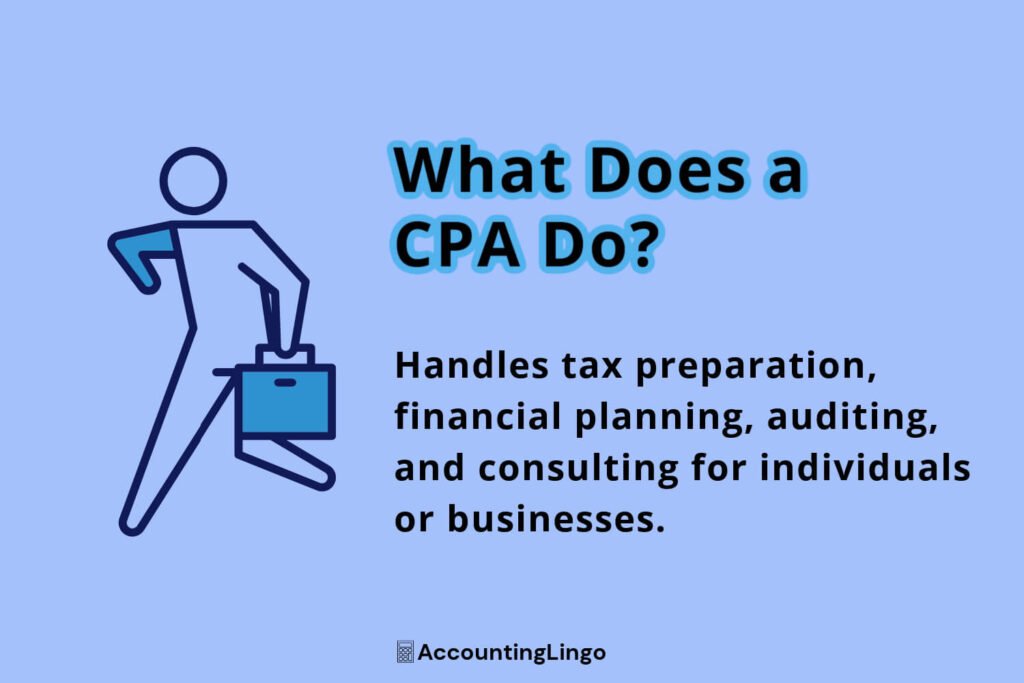
What Does a CPA Do?
A CPA commonly handles tax preparation, financial planning, auditing, and consulting for individuals or businesses.
“Offers advice on tax strategy, investing, analyzing data, etc.” -University of North Carolina
CPAs, also known as Certified Public Accountants, are financial experts that have passed a rigorous exam and met specific licensing requirements. They have the skills to address a wide range of important accounting topics for individuals and businesses. Whether you’re looking to file your personal taxes correctly, understand complex financial reporting topics, or need guidance managing your business finances, CPAs provide invaluable assistance.
Common CPA service-related topics include:
Tax Preparation
Most people primarily associate CPAs with tax preparation. As specialists in tax law, CPAs can help individuals and businesses prepare and file their tax returns accurately and on time to minimize their tax liability. They also provide tax planning strategy advice that helps clients save money.
Financial Planning
CPAs also provide financial planning services. They can assist individuals or businesses in developing a comprehensive financial plan that considers their current financial situation, goals, and primary objectives. Investment strategies, retirement planning, and estate planning are also financial services CPAs provide.
Auditing
Many CPAs work in the auditing field in which they are responsible for analyzing financial statements and other records to ensure accuracy. Statements must comply with all applicable accounting principles and governmental regulations. CPAs also supply advice on internal controls and risk management. Investigative techniques are also used in identifying financial crimes during the auditing process, also referred to as forensic accounting.
Consulting
Consulting is a common CPA service for businesses of all sizes. It aids businesses in the development and implementation of financial policies and procedures. In addition, CPAs can assist with forecasting, providing guidance regarding mergers and acquisitions, along with designing strategies to improve a business’s capital turnover ratio.
CPA Jobs and Responsibilities
CPAs work in a variety of industries and hold many job titles.
Common roles for CPAs include:
Auditor
Auditors are common within the CPA profession. They review financial statements and records to ensure accuracy and compliance with accounting principles. They may work for accounting firms, government agencies, or private companies. Auditors can also specialize in certain industries, such as construction or technology.
Financial Analyst
Another common CPA job is that of a financial analyst. Those in this role are responsible for analyzing financial data and providing insights and recommendations to help organizations make informed business decisions. Analysts may work in a variety of different environments such as investment firms or banks. They may choose to specialize in areas like risk management, portfolio management, or mergers and acquisitions.
Controller
A controller is a CPA in a higher-level role that oversees the financial operations of an organization. Their responsibilities often include financial reporting, forecasting, and budgeting. As a result of their deep understanding of a company’s financial condition, controllers often engage with top management regarding strategic planning and decision-making. Controllers work in a variety of industries which may include mining, advertising, and education.
Chief Financial Officer
The Chief Financial Officer (CFO) is a senior position within a company’s finance department. They oversee all operations involving accounting, budgeting, forecasting, and financial reporting. Due to their deep understanding of an organization’s financial framework, CFOs play an active role in strategic planning and decision-making. This position often requires CPA certification, which demonstrates an individual has a solid understanding of accounting principles.
CPA vs. Accountant: What’s the difference?
Terms like “CPA” and “Accountant” are often used similarly, however there are important differences. It can be said that all CPAs are accountants, although not all accountants are CPAs. Becoming a CPA requires an individual to meet specific educational and licensing criteria. In addition, they must pass a difficult exam. Once passing, a newly minted CPA is still subject to meeting continuing education requirements to maintain their license along with adhering to strict ethical and professional standards.
In comparison, accountants may have a degree in accounting or a similar field, however, they do not necessarily hold a CPA license. Accountants may work in a variety of fields including bookkeeping, tax preparation, and auditing. Both CPAs and accountants are considered highly skilled. Although, CPAs are often considered the most qualified.
The CPA certification is valuable for higher-end roles such Controller or CFO. CPAs often have advanced expertise in specific areas of accounting.
How to Become a CPA
Becoming a CPA requires a strong educational background as well as training. The candidate must possess a bachelor’s degree in accounting or a closely related field. In addition, a certain number of credit hours in accounting and business courses are required.
Individuals must take the CPA exam after meeting all the educational requirements. The exam consists of four parts that cover various aspects of accounting and financial reporting. In addition, after passing the exam, individuals must meet specific licensing requirements in their state, which can include additional education or experience requirements.
After a CPA license is issued, it must be maintained by meeting specific continuing education requirements. This often includes completing a certain number of educational courses each year, which helps CPAs stay up-to-date on current accounting and financial reporting standards.
Additional Resources
Other helpful topics may include:
Setup Accounting for an LLC
How Does Vouching Work?
What is a Field Auditor?
